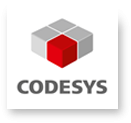CODESYS IIoT Libraries SL
The software package “IIoT Libraries SL” contains libraries for “IIoT communication” and libraries for reading and writing of data structures.
The software package “IIoT Libraries SL” contains libraries for “IIoT communication” and libraries for reading and writing of data structures.
The product “IIoT Libraries SL” contains numerous libraries to support different communication protocols (for example, MQTT and HTTPS) and includes tools for encoding and decoding data structures (for example, JSON and XML). Moreover, libraries with POUs for direct communication with cloud services of individual providers (AWS, Azure, etc.) are provided. The components contained in the CODESYS package are ideally suited for communication in the IIoT environment.
The library “Web Client SL” contains function blocks for communicating with a web server via HTTP or HTTPS.
The HTTP method GET requests data from a web server.
The HTTP methods POST and PUT submit data from the controller to a web server.
When using DELETE, data is deleted from a web server.
The HTTP method HEAD returns the HTTP header.
The HTTP header of a request can be extended without any restrictions. In addition, function blocks are included for HTTP basic authentication, Digest access authentication and authentication via OAuth (Version 1a and 2).
MQTT (Message Queuing Telemetry Transport) is an open-source IoT protocol that allows for the transmission of telemetry data as messages between devices. Device communication always takes place by means of an MQTT broker (e.g. Mosquitto https://mosquitto.org/). Messages are sent and subscribed to based on topics. A topic corresponds to a path (e.g. device1/temperature). Subscribing to messages is done by specifying a topic filter. Wildcards are also permitted (+ for one level and # for multiple levels). The message format is not fixed, which means that a JSON string or any data structure can be transmitted.
With the “MQTT Client SL” library, messages can be sent from a CODESYS controller to an MQTT broker, and messages can be subscribed to based on topics.
This library contains function blocks for sending, receiving, and deleting emails by means of SMTP and POP3 protocols. Communication with the mail server can be established either encrypted (TLS) or unencrypted.
Supported SNMP features:
SNMP GET: Request a value.
SNMP GET_NEXT: Request a value and get the OID from the next value.
SNMP Agent: Enables devices to request values from the control (agent).
SNMP TRAP: Send and receive TRAP/INFORM telegrams.
SNMP SET: Set values via SNMP
SNMP V1
SNMP V2c
SNMP V3
The library SNTP Service SL contains function blocks for easy implementation of SNTP client and server components on a CODESYS control (SNTP V3, SNTP V4). The function block SNTPGetUTCTime can be used to request the UTC time of a SNTP/NTP server. The function block SNTPServer can be used to build a simple SNTP server.
Function blocks (FBs) of the SNTP library:
SNTPGetUTCTime: FB to request the time of a SNTP server (SNTP client)
SNTPServer: FB to send the local server time (SNTP server)
The “AWS IoT Core” service is a managing cloud platform from Amazon in which connected devices can work together easily and safely with cloud applications and other devices. The “AWS IoT Core Client SL” library provides function blocks for sending and receiving messages. Communication is encrypted and takes place by means of the MQTT protocol. In the AES environment, messages are typically transmitted in JSON format. The “JSON Utilities” library can be used for parsing and creating JSON files.
The “Azure IOT Hub” cloud service from Microsoft directly links IoT devices. (For more detailed information, refer to https://azure.microsoft.com/en-us/services/iot-hub/). The “Azure IoT Hub Client SL” library provides function blocks for sending and receiving messages. A sample project demonstrates how to use the library.
The ‘JSON Web Token SL’ library contains a function block for creating a JWT (JSON Web Token) on the controller. For this purpose, the algorithms HS256, HS384, HS512, and RS256 are supported.
The WebSocket protocol allows for bidirectional communication between a client and a Web Socket Server over the Internet. Communication usually takes place via TCP port number 443 (or 80 for unsecured connections). The ‘Web Socket Client SL’ library provides function blocks for communication via the WebSocket protocol.
With the OpenWeather Client SL Library it is possible to query weather data from an API server provided by OpenWeather.
Supported services are:
Querying the current weather for a specific location
Query an hourly weather forecast for the next 48 hours for a specific location
Query location information about
City name
Postal code
GPS coordinates
To use the library, you need an API key from OpenWeather.
The library CSV Utility SL provides function blocks to read and write CSV files. The library contains the components CSVReader (read a CSV file) and CSVWriter (write a CSV file). All function blocks can be used in a classical or object oriented way. An example project demonstrates the usage of all components.
“INI File Utility SL” is a library to read and write INI files. The library contains function blocks to read, write and find values of INI files. An example project shows the usage of the library and their function blocks.
The ‘JSON Utilities SL’ library provides the following functionalities:
Read JSON files (UTF-8 and UTF-16)
Read JSON byte arrays
Write JSON files (UTF-8 and UTF-16)
Read JSON byte arrays
Search for keys, values, and child and parent elements
The data is stored in an array of structures. Data access and element search is performed by means of methods from the JSONData function block. The simple creation of a JSON-File can be realized with funcion block JSONBuilder. The function blocks JSONByteArrayReader and JSONFileReader read data in JSON format and save the values in the JSONData function block. Writing files and byte arrays is performed by means of the function blocks JSONFileWriter and JSONByteArrayWriter.
A simple REST client can be implemented easily in connection with the library ‘Web Client SL’.
The library “XML Utility SL” contains function blocks to read and write xml files or xml strings on a control. All elements of the xml file are stored in an array of structures. The library also contains function blocks to find elements by name and attribute. The usage of the library is demonstrated by two example applications.
The company name of the libraries has been changed to ‘CODESYS’. When upgrading to version 1.9.0.0, the old libraries (< 1.9.0.0) must be removed via the Library Manager and the new libraries must be inserted.
The example projects are now installed in the folder ‘IIoT Libraries SL’ of the CODESYS installation (CODESYS root folder).
The library documentation is now integrated in the CODESYS Online Help. See https://content.helpme-codesys.com/en/libs/index.html The CHM files are no longer part of the package.
Development system | CODESYS Development System V3.5.18.0 |
Runtime | CODESYS Control V3.5.18.0 |
Supported platforms and devices | Note: Use the “Device Reader” project for locating the functions supported by the PLC. |
Additional requirements | The libraries Web Client SL, MQTT Client SL, Mail Service SL, AWS IoT Core Client SL, Azure IoT Hub Client SL require amongst others the libraries SysSocket2 3.5.16.0, Net Base Services, CmpCrypto, CmpTls 3.5.15.0 and CmpX509Cert. The libraries CSV Utility SL, INI File Utility SL, JSON Utilities SL and XML Utility SL require amongst others the library SysFile. |
Restrictions | The inputs itfAsyncProperty and the AsyncProperty are supported for Net Base Services V3.5 SP17 Patch 4 and higher. For older versions, deadlocks may occur when the controller is reset. In this case the AsyncProperty must not be used. Due to a bug in the Net Base Service library in version 3.5.19.0, TLS connections cannot be established. Please use a different version of Net Base Services. |
Licensing | Single device license: The license can be used on the target device/PLC on which the CODESYS runtime system is installed. Licenses are activated on a software-based license container (soft container), which is permanently connected to the controller. Alternatively, the license can be stored on a CODESYS Key (USB dongle). By replugging the CODESYS Key, the license can be used on any other controller. Note: In demo mode, the software runs for 30 minutes without a license. After that, a manual restart is required. |
Required accessories | - |

Technical support is not included with this product. To obtain technical support, please purchase a CODESYS Support Ticket.
For general error messages or pre-sales inquiries, please use the "My Question" contact form directly, which can also be used without logging in. A list of alternative support resources can be found in the support section of the CODESYS Group website.


CODESYS GmbH
A member of the CODESYS Group
Memminger Straße 151
D-87439 Kempten
Germany
| Further information about our releases can be found at: CODESYS Releases & Teaser Notes |
|